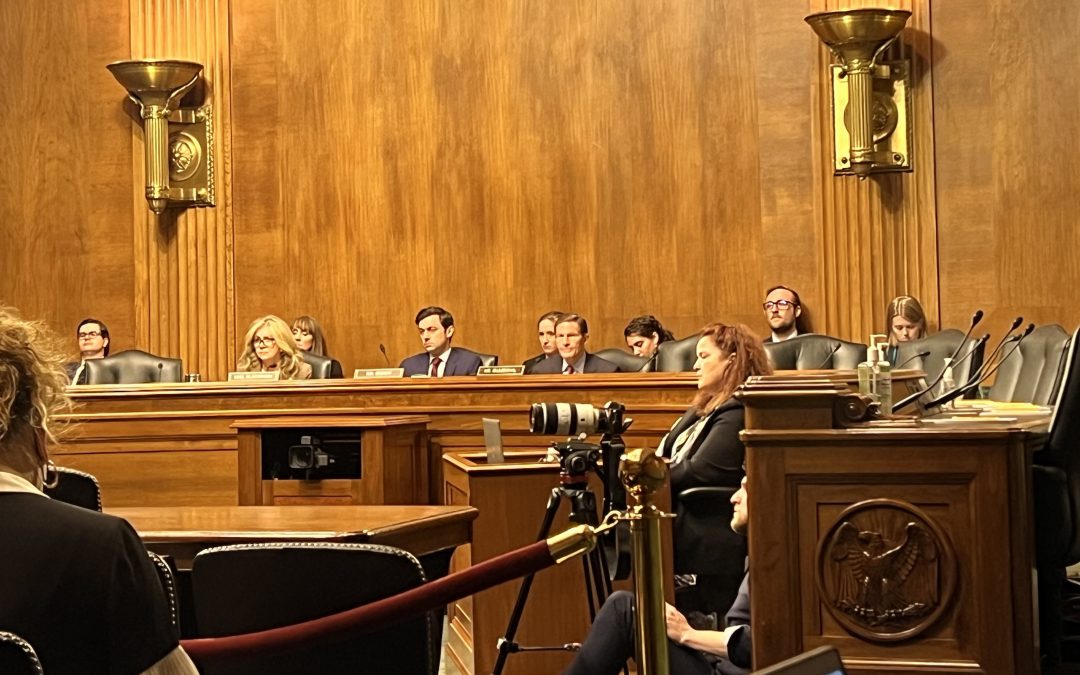WASHINGTON — In February of 2023, the U.S. Senate Human Rights Subcommittee Chairman Jon Ossoff launched a bipartisan inquiry following reports that children in the care of Georgia’s state government have been subject to abuse and neglect.
In 2018, the Georgia Division of Family and Children Services (DFCS) placed 2-year-old Brooklynn Aldridge in the care of her estranged father and his girlfriend, after the toddler’s mother was arrested. Brooklynn’s mother, Rachel Aldridge, repeatedly objected to the placement, worried that her daughter was put in an unsafe environment.
When Aldridge was released from jail, she visited Brooklynn’s father’s home and reported a bruise on her daughter’s leg. The child welfare agency did not take any action.
After six weeks in her father’s care, Brooklynn was killed by his girlfriend, who was sentenced to life in prison in 2019. The cause of death was blunt force trauma to the head.
The ongoing inquiry, led by Sen. Jon Ossoff, D-Ga., and Sen. Marsha Blackburn, R-Tenn., held its first public hearing Wednesday as it examines threats children face in foster care institutions in Georgia and across the country. The ultimate goal of the investigation is to prompt reforms at both state and federal levels.
“Brooklynn would still be alive if anyone at DFCS had just been willing to listen to me, her own mother,” Aldridge said before a Senate subcommittee on Wednesday. Aldridge took her first plane ride to testify at the hearing. She was one of more than a hundred witnesses that have testified during the eight months that the subcommittee had been investigating the foster care system.
Throughout the hearing, Sen. Ossoff repeatedly referenced a grim statistic. The Division of Family and Children Services failed to meet its obligations to assess risks and manage children’s safety 84% of the time. The number came from the agency itself in a 2023 internal audit.
After the hearing, DFCS lawyers sent a letter to Ossoff and Blackburn claiming some of the witnesses’ and subcommittee members’ statements were inaccurate. The letter said Brooklynn was ordered into her father’s care by a Georgia superior court and was not in DFCS custody at the time of her death.
Melissa Carter, a witness and executive director of Emory University’s Child Law and Policy Center, said when a government agency intervenes in a family, it is obliged to continuously assess the safety of the children. For example, in the case of Brooklynn Aldridge, Carter said the Georgia Division of Family and Children Services should have better assessed options for a substitute caregiver by conducting background checks and remaining involved in her case.
“There’s this ongoing responsibility to be checking in, to just make contact with that child, with those caregivers, to continue to take in information, to adjust on the basis of changing circumstances,” she said.
We heard heartbreaking testimony from Rachel Aldridge, a Georgia mother, whose two-year-old daughter Brooklynn was murdered while in care — a proper background check had not been carried out. The reports that she had made about concerns for her daughter’s health and safety had not been heard.
Senator Ossoff spoke passionately of the testimony of Mon’a Houston, an inspiring 19-year-old young woman who had been in foster care and described being locked up like an inmate while she was in care and testified to being overmedicated, while she was in care.
In her time under the state of Georgia’s care, Houston said she was placed in group homes, institutions and hotels more often than in foster homes. “I would often go more than six months without seeing my caseworker. I felt alone,” she said.
Emma Hetherington, another witness at the hearing and a law professor at the University of Georgia, said the overarching structure, internal policies and administrative barriers of the Division of Family and Children Services obstruct its good work, causing her clients to “experience extreme harm.”
Among 35 of her clients, she said most of them made allegations of abuse or neglect against their foster care placement caregivers. All of them experienced “early childhood maltreatment.”
“The foster care system in Georgia has always struggled with systemic challenges and barriers, but I’ve never seen it as dismal as it is today,” she said in her testimony.
The Georgia Department of Human Services, the department that oversees the Division of Family and Children Services, declined to comment in an email to Medill News Service.
Chairman Ossoff hopes the testimony at the live hearing brings results. “Foster care is meant to provide sanctuary for our most vulnerable children,” he said. The first-hand testimony from children and parents who have suffered grievously is the first step in Congress’s effort to provide the facts needed to enact necessary reforms.


